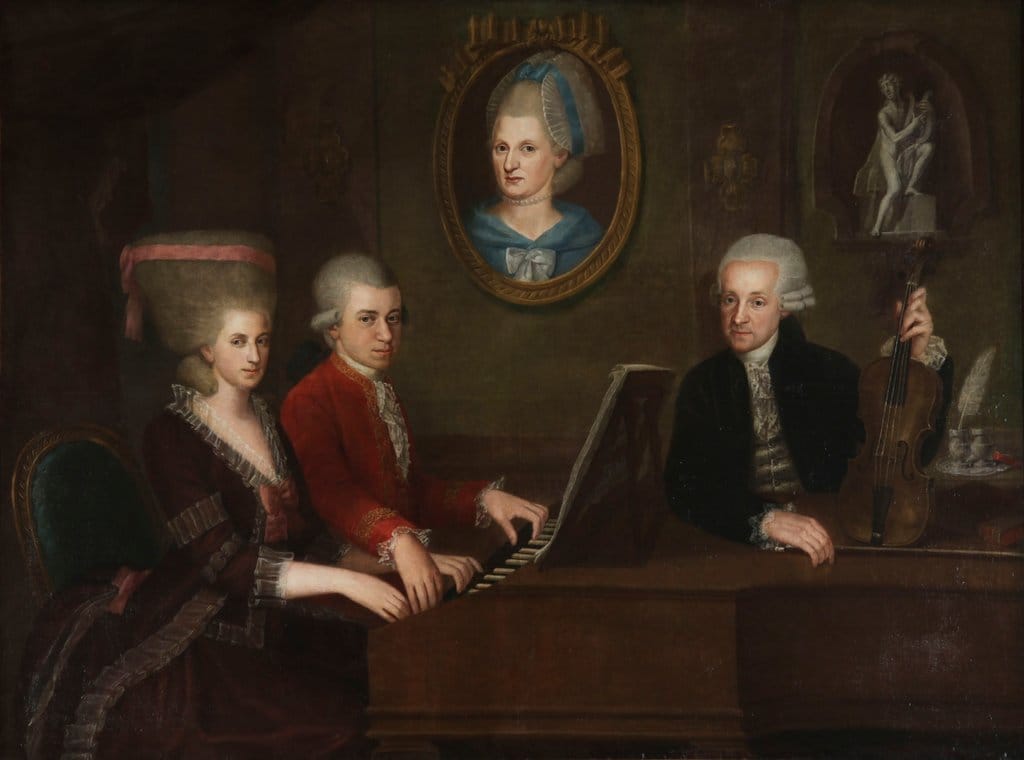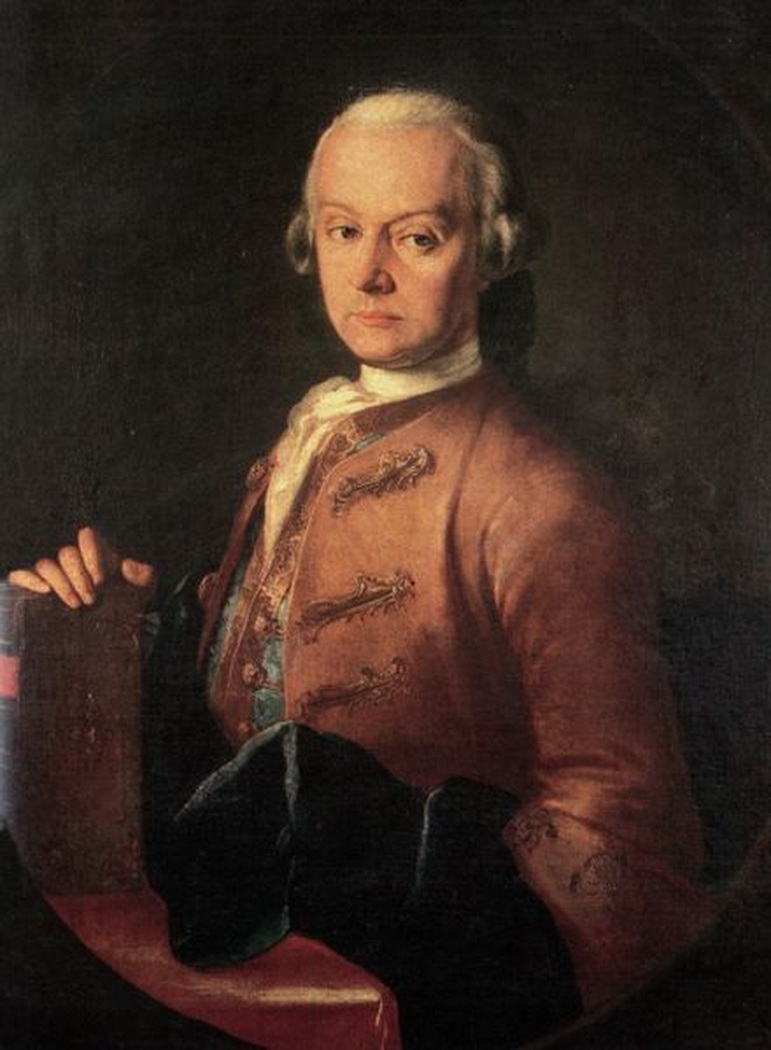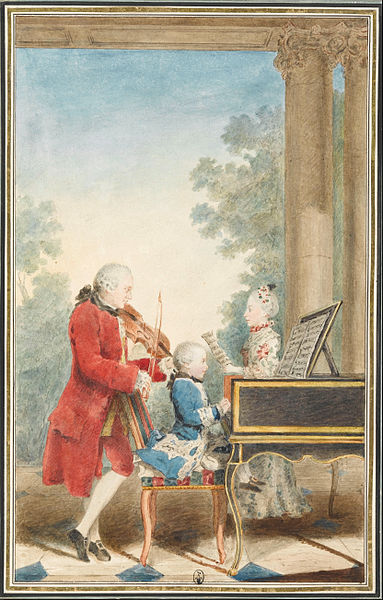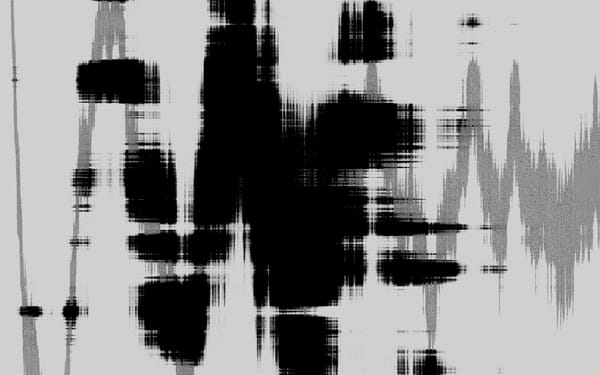The Other Mozart

1756 was a momentous year for 37-year old Leopold Mozart, fourth violinist at the court of the Prince-Bishop of Salzburg. His comprehensive Treatise on the Fundamental Principles of Violin Playing was published, and his son, christened Joannes Chrysostomus Wolfgangus Theophilus, was born. How momentous that birth would make the year, was realised by Leopold later, but no later than a mere three years, when the boy displayed his phenomenal gift.
Today, January 27, when ‘the’ Mozart’s birth anniversary is celebrated with the customary concerts, recording releases, effusions on social media by his enormous fan following, and when Brand Mozart (chocolates, souvenirs, liqueurs and assorted kitsch) does brisk business, it is perhaps quite appropriate to acknowledge the other Mozart, teacher, father, composer and the man who moulded the early years of a genius. History has not judged him very kindly, and Leopold remains a controversial figure, labelled greedy, ambitious, manipulative and harsh. But, he has also been described, from the evidence of contemporary sources, as devoted, selfless in his service to his son, and a loving father who greatly aided the flowering of that genius; a man who exclaimed that his son was “a miracle which God let be born in Salzburg!”

Let us first look at Leopold away from the shadow of Wolfgang: born into a non-musical family (his father was a bookbinder in Augsburg), he studied at a Jesuit school in that town. Among his subjects were logic, science and theology. He nurtured his interest in music by himself, singing in a church choir and taking active part as an actor and singer in student theatre productions. He then studied the playing of the organ and violin, becoming a highly skilled performer on the latter. Going on to the university in Salzburg, he studied philosophy and jurisprudence, gaining a bachelor’s degree. This exposure to the world of ideas outside of music was to prove vital to his thinking, affecting his views on music, and, inevitably, those of his son’s. In his Treatise… he emphasises the need to understand ‘affekt’ (emotion/expression) through the study and reading of literature, and particularly, poetry. Poetry, he believed, was the key to achieving good phrasing.
This scholarly work was widely acclaimed, and translated, during his lifetime, and even today is a valuable reference work for 18th century performance practice. As a teacher, he applied his pedagogical methods with great zeal and meticulous attention to every aspect of learning, to two supremely gifted children—his daughter Anna Maria (Nannerl), and his son, Wolfgang. Nannerl was an admiring and faithful chronicler of her little brother’s early years. In one telling incident, she recounts how father and son had a bedtime ritual of part-singing a melody composed by the child, after which he “would kiss his father most tenderly”, before being tucked into bed. Though Leopold set a highly rigorous study regimen for his children, which included non-musical subjects, he was a demonstratively loving parent too.

By the time his son was five and had some compositions to his credit, Leopold decided it was time to show his children to the world. It was these tours, across much of Europe, where Wolfgang and Nannerl performed before crowned heads, aristocrats and the general public that has earned Leopold the harshest criticism. Seen through the prism of 19th and 20th century morality, he has been accused of exploiting his children’s talent, treating little Wolfgang as a mere performing monkey, and robbing his children of their childhood. It would be fairer to look at this in the context of his times. Children were treated as small adults, and childhood needs, psyche and development were not recognised. Leopold, though economic considerations must certainly have figured in his plans, saw, in the widespread interest in prodigies, an ideal opportunity to make the world marvel at his two ‘miracles’. The travel, as all such travel was in those days, was one of extreme discomfort and hardship. As they toured through Germany and Austria, the Mozart family was exposed to bad roads, inclement weather, dingy inns and more. The exhibition concerts taxed their frail strength, and at Schonbrunn Palace, the Emperor had Wolfgang indeed be a performing monkey, with party tricks like playing with the keyboard covered. He fell ill, and Leopold lamented that “My boy’s illness has meant a setback of about four weeks…” (and a loss of expected income). But widespread interest in the prodigies had been kindled, and Leopold, striking while the iron was hot, set forth on a grander tour, which lasted over a year, and included visits to France and England. Always with an eye on posterity, he presented some of his son’s early composition manuscripts to the British Museum, and the family returned to Salzburg with comfortable profits. The tour, however, had taken a great toll on the boy’s mental, emotional and physical strength, something that Leopold was unable to understand.
Taking leave once again from his employer, Leopold and Wolfgang set out for Italy. This long sojourn was a spectacular success, with the Pope bestowing a title on the young phenomenon. Though the boy was now 14, and beyond the age to be considered a prodigy, he was small and delicate, which helped create the right impression. When they returned to Salzburg, Leopold had been away from his job for 7 years, with his employer having till now, readily having granted leave, believing the Mozarts added to the reputation of his court. Soon, father and son were working at the court of a new Archbishop, and the son was to begin his years of making a bid for freedom and a resultant troubled relationship with a hitherto beloved father.

Leopold put his duty to nurturing his son’s genius, and ensuring the world recognised and rewarded that genius, above all else. Though he was a fairly prolific composer, who used some unusual orchestration (his Hunting Symphony featured actual pistol shots, and his ‘Peasant Wedding’ included whistles and the hurdy-gurdy), and wrote a great deal of sacred music, his compositions are rarely part of current performance repertoire. Perhaps the comparison with his son is partly responsible! His later frustration with his son’s life in Vienna was due to his conviction that Wolfgang was not being given his due, partly because he himself was too feckless to further his career. The devotion, however, remained unfaltering and some of it was transferred to Nannerl’s little son, Leopold. The child was left with her widowed father who lavished tenderness and dedicated teaching to young ‘Leopoldl’. Undoubtedly he hoped that in this child he would reclaim his Wolfgang’s early genius. It was not to be. He died in 1787, five years before his son’s early death. Wolfgang’s ‘rebellion’ against Archbishop Colleredo had done considerable harm to Leopold, and his final years were described by him as being “…a quiet life… of reading, music… and chess”. From being the dominant figure on the stage of his son’s life, he faded away into the wings. His place in history endures.






